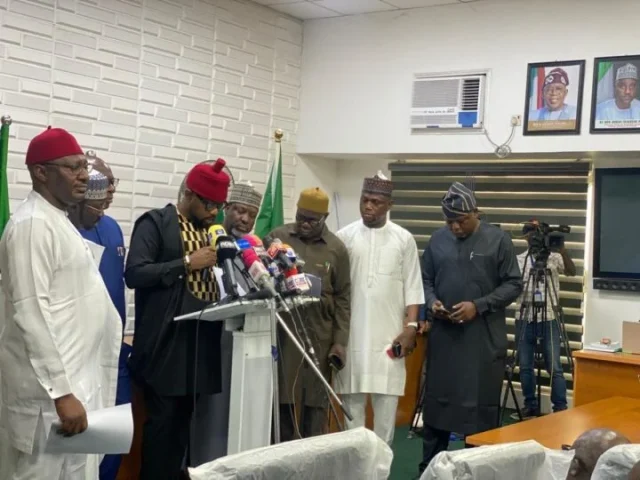Ugochinyere and 34 Members of the House of Representatives are canvassing for a six-year single term for Nigerian President and governors.

In a significant move, thirty-five members of the House of Representatives have proposed a six-year single term for the country’s presidency.
The announcement was made during a press conference on Monday by Rep. Ikenga Ugochinyere (PDP, Imo), who was flanked by his colleagues and co-sponsors of the bills.
The proposed legislation, which has passed its first reading, seeks to extend the term of the president and governors to six years, moving away from the current two-term limit of four years each as stipulated by the 1999 constitution.
One of the bill’s key feature is the rotation of system executive powers among Nigeria’s six geopolitical zones. This measure aims to “ensure equal representation and reduce the desperation and tempo of agitation for the creation of states,” Ugochinyere said. The legislators believe that this rotation will foster national unity and inclusiveness.
In addition to the proposed term extension and rotational presidency, the caucus has introduced several other constitutional amendments focused on governance, restructuring, and electoral matters.
Notably, they seek to amend Section 3 of the constitution to recognize the division of Nigeria into six geopolitical zones formally. Another significant proposal is the creation of two vice-presidential offices, one from the southern and one from the northern parts of the country.
“The first vice-president shall be a succession vice president, while the second vice-president shall be a minister in charge of the economy, and both shall be ministers,” Ugochinyere stated.
He further explained that “the president and the 1st vice-president shall come from the same part of the country (north or south) and shall become president whenever the president becomes incapacitated.”
Local Government Reforms
The lawmakers are also pushing for substantial reforms at the local government level, including financial autonomy and enhanced accountability.
They propose an independent consolidated local government council account, supervised solely by local councils, and severe penalties for the misuse of local government funds. They stipulate that any state government failing to remit allocated funds to local government councils will forfeit future federal allocations.
Electoral Reforms
The caucus has outlined extensive electoral reforms, aiming to amend the Electoral Act of 2022. Their proposals include holding all elections on the same day to streamline the electoral process and ensuring that results are verified against accredited voter lists and electronic devices before being declared. They also advocate for legal repercussions for any Independent National Electoral Commission (INEC) official who declares false results.
“No declaration of a winner of an election shall be done by the relevant INEC officials until such officer has compared the results with the list of accredited voters and ensured that the results to be declared are in tandem with the list of accredited voters and the B-VAS machine or any other electronic device.
“To provide that any INEC officer who declares a false result will be liable for civil and criminal action personally brought against him by parties in the elections,” the lawmakers said.
Furthermore, they propose that all election-related litigations be resolved before the swearing-in of elected officials, with a six-month window for the conduct and conclusion of these litigations. They emphasize that all election-related documents and materials should be accessible to participants questioning the election results at the tribunals.
Call for Support
The legislators urged their colleagues to support the proposed bills to facilitate their passage through the constitutional amendment process. They highlighted that these reforms align with previous reform efforts by eminent Nigerians and past administrations including the Justice Uwais electoral reforms, the Senator Ken Nnamani electoral reform committee, the Udoji civil service reform reports, the Confab reports, Obasanjo, Jonathan, IBB, Abacha reform and several others which have been neglected despite significant investments of time and resources. “It’s time we revisited those reports, adopted some of the salient proposals, and adjusted them to fit the current realities,” they said.
For these amendments to become law, they must pass through rigorous legislative scrutiny, including the approval of two-thirds of all state assemblies, as required by Sections 9(2) and (3) of the 1999 constitution. This equates to the assent of 24 state assemblies.
